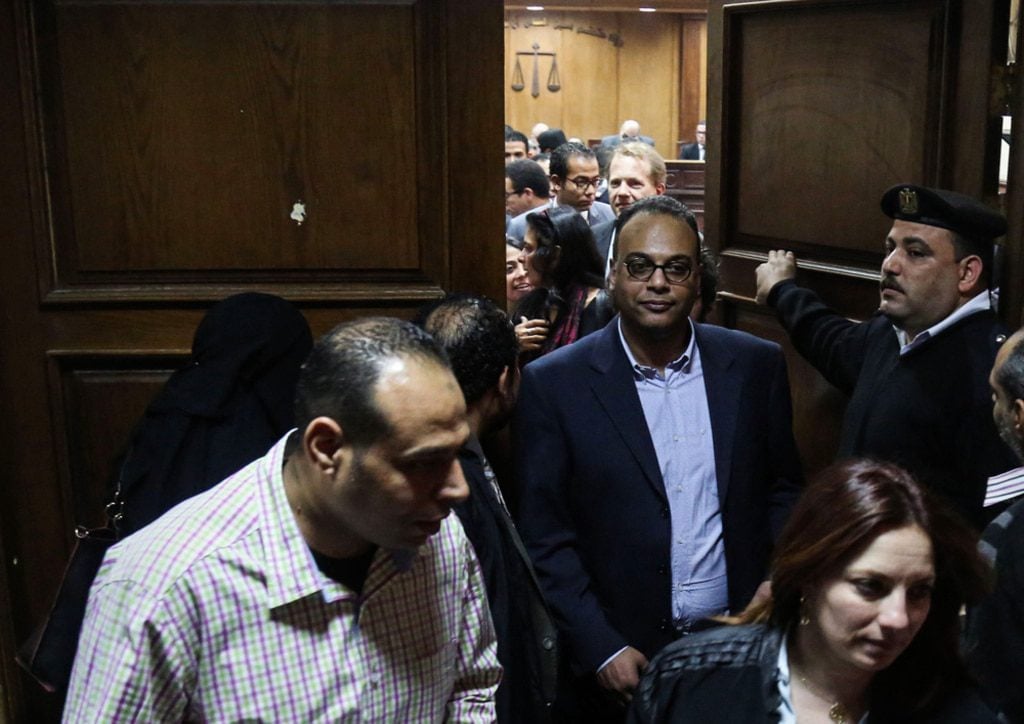
Egypt’s non-governmental organizations (NGOs) and international donors were taken by surprise when, on 29 May 2017, President Abdel Fattah al-Sisi ratified a long-delayed law that imposes severe restrictions on their activities.
Parliament approved the law in November 2016, despite widespread opposition from representatives of the nearly 40,000 NGOs working in Egypt who described it as ‘a death blow’ and a ‘declaration of war’.
It languished in a presidential drawer for the next six months without being ratified, giving NGOs and foreign donors some hope that the president would return it to parliament and ask for amendments, in line with his constitutional powers.
Shortly before midnight on 29 May 2017, however, the state-run Middle East News Agency reported that al-Sisi had ratified the law without any changes, ending any hope that it could be improved or amended, at least in the short term.
Lawyers representing NGOs said they would appeal the law in the Constitutional Court, claiming that it violates the guarantees stipulated in the Egyptian Constitution and standards regarding freedom of expression and association.
Among the main concerns for the NGO community, the European Union and several US senators, who issued harshly worded statements criticizing the law, is a clause that places NGOs not just under the control of the Ministry of Social Affairs, as was the case in the past, but with the added supervision of a newly created body: the National Authority for the Regulation of Foreign NGOs, which includes representatives from the Ministry of Defence, General Intelligence, the Interior Ministry, the Foreign Ministry, the Justice Ministry and the Central Bank.
The law strictly controls the funding of NGOs. It states that NGOs must obtain permission from the new authority 30 days in advance to receive donations from Egyptian entities or individuals inside Egypt. It must also inform the Social Solidarity Ministry upon the receipt of these funds, which cannot exceed 10,000 Egyptian pounds (EGP) ($550) in cash. Larger donations must be received as a cheque, which the authority must clear first. The law further states that NGOs may receive funding or grants from foreign entities inside Egypt or Egyptian or foreign entities outside Egypt as long as the authority is notified within 30 days of receipt. The authority then has the right to reject the funding within a 60-day period following its notification. NGOs may not use these funds within the 60-day review period.
Mohamed Salem, who runs Rassd, an NGO that monitors human rights violations, said that the funding controls will discourage many Egyptians from giving money to local NGOs because no one wants his or her name to be reviewed by security agencies or get into any sort of trouble.
The law could also seriously impede the creation of new NGOs. Currently, the Ministry of Social Solidarity requires 60 working days, or nearly three months, to approve new NGOs. If the ministry fails to respond within the three months, the NGO is considered legal and can begin its work. Under the new law, the ministry’s failure to respond indicates that approval has been denied.
Furthermore, the law requires any new NGO to pay a registration fee of 10,000 EGP, making it increasingly difficult for organizations on a shoestring budget to register. An NGO’s board members will also have to present their financial records to the Ministry of Social Affairs for review, a requirement that fails to take into account that most of those working for NGOs do so as volunteers. Foreign NGOs that want to work in Egypt will have to pay 300,000 EGP ($16,700) for a licence.
All NGOs are prohibited from conducting activities that ‘threaten national security, public order or public morality or public discipline’, vague terms that critics say could be abused to constrain legitimate activity. Neither can they operate in fields in which political parties or trade unions are active, such as political participation, governance or workers’ rights.
Additionally, the law introduces hefty penalties for non-compliance, notably fines ranging from 50,000 to 1 million EGP ($2,800 to $55,500) and prison terms of up to five years. Among the violations that could result in a penalty are conducting an opinion poll without prior approval, restructuring the board of directors, opening new branches and even moving to a new office without informing the authorities in advance.
Negad al-Boraie, a lawyer and member of several human rights groups, said the ratification of the law cannot be separated from the state’s wider crackdown on civil society or those related to public freedoms such as freedom of expression. “When al-Sisi became president, he declared he had no room for dissent or basic freedoms because he was involved in a war against terrorism,” said Boraie. “That’s why we can see the space closing down, not just for NGOs but also for the media, the independent syndicates and political parties.”
When parliament debated the law in November 2016, MPs known to support al-Sisi said it was needed to fight ‘Western attempts’ to infiltrate and divide Egypt along sectarian lines, as happened in Syria and Iraq. Parliamentary Speaker Ali Abdel Aal accused MPs who opposed the law of being foreign agents. He reiterated a common conspiracy theory that al-Sisi himself has referred to repeatedly: that many NGOs are part of a so-called ‘fourth-generation war’ that depends on non-traditional means to weaken Egypt’s integrity and stability and open it up to Western influence.
Al-Sisi often warns of Western interference in the region’s affairs through NGOs and other “foreign agents” or “people of evil” who receive training abroad to promote ideas such as democracy and human rights.
It is likely that it was these kinds of suspicions that led to an increased number of travel bans against several prominent human rights activists, including Hossam Bahgat, Gamal Eid, Mohamed Zarie, Aida Seif al-Dawla, Mozn Hassan and Azza Soliman. These activists also face charges of illegally receiving foreign funds and some have had their assets frozen by court order.


